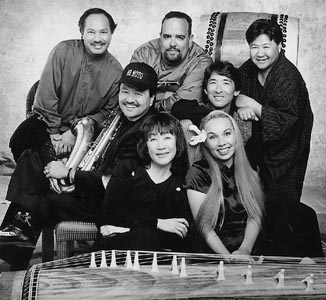![[Metroactive Music]](/music/gifs/music468.gif)
[ Music Index | San Jose | Metroactive Central | Archives ]
 In a Zither: Hiroshima's inventive fusion sound gets a boost from the koto, a Japanese stringed instrument similar to a zither. Hiroshima Mon Amour Japanese-American fusion band Hiroshima brings an edge to smooth jazz By Jim Aquino SMOOTH JAZZ can often be too banal for my tastes, but there are some artists who rise above the genre and are capable of compelling and inventive moments in their material. One of these acts is the East L.A.-based, Japanese-American fusion instrumental band Hiroshima. The group was formed in 1974 by principal composer, keyboardist and saxophonist Dan Kuramoto; his wife, June Kuramoto, one of the world's foremost players of the Japanese koto string instrument; and percussionists/taiko players Johnny Mori and Danny Yamamoto. Though some of Hiroshima's later albums are hit or miss, the band stands out from the smooth-jazz pack because of the substance of its music. Several of Hiroshima's most intriguing compositions are about the joy and pain of being Asian American or Japanese-American (except for June Kuramoto, who grew up in Japan, all the founding members are sansei, or third-generation Japanese-Americans). The band has written pieces about historical events like the Hiroshima tragedy (1989's "Thousand Cranes") and about the beauty of multiplicity in their music and Japanese-American heritage ("Cruisin' J-Town," "One World" and last year's "Mix Plate"). Inspired by their favorite African American and Latino soul and jazz acts, the Kuramotos and Mori, who attended California State University at Long Beach together, started Hiroshima because they wanted to give Asian Americans a voice in the soul and jazz scene. Hiroshima's brand of fusion jazz, a mix of Japanese elements and soul, reggae and salsa rhythms, reflects the members' experiences of growing up in a multiracial section of L.A. (The formation of Hiroshima is well-documented in filmmaker Duane Kubo's interesting 1976 short, Cruisin' J-Town, an important early film in the history of Asian American independent cinema.) Personally, I prefer the R&B sound of Hiroshima's earlier albums over the band's more somber and New Agey later material, mostly because of the early albums' carefree, let's-groove-while-cruisin'-J-Town-in-our-low-rider spirit. On the band's website (www.hiroshimamusic.com), Dan Kuramoto lists Earth, Wind and Fire, Santana and Jimi Hendrix as his original influences; the slow-jam grooves of the Isley Brothers and War must also have influenced Hiroshima's early ballads, which were sung by its spirited former vocalist, Teri Koide.
Where the Gals Are: Women jazz artists will be featured at this year's San Jose Jazz Festival. Best of the Fest: Metro writers offer some of their festival picks.
Hiroshima's finest album to date is actually a more recent one: 1994's pulsating L.A., recorded for Quincy Jones' Qwest label. Written as a response to the riots and racial tensions that divided blacks, whites and Koreans in their hometown in 1992, L.A. marked a return to the band's SoCal soul roots. It includes one of their edgiest and most striking compositions, "One World," a percussive, passionate plea for unity in which Mori's booming taiko, Kuramoto's koto and a chorus of electric guitars collide with both grace and urgency. Too much of smooth jazz is devoid of what drew me to jazz in the first place: its spontaneity and its cathartic power as a pre-hip-hop form of expression for people of color (perhaps the most famous example of the latter is Billie Holiday's still-provocative anti-lynching song, "Strange Fruit," the subject of an acclaimed recent book of the same name by Pulitzer Prize-winning author David Margolick). In its best moments--and "One World" is definitely one of them--Hiroshima restores both those qualities.
Hiroshima performs at the San Jose Jazz Festival on Saturday, Aug. 12, at 6pm, on the Southwest Airlines Main Stage in the Plaza de Cesar Chavez, Market and San Carlos streets, San Jose. Admission is free. (888.SAN.JOSE) [ San Jose | Metroactive Central | Archives ]
|
From the August 10-16, 2000 issue of Metro, Silicon Valley's Weekly Newspaper.
Copyright © 2000 Metro Publishing Inc. Metroactive is affiliated with the Boulevards Network.
For more information about the San Jose/Silicon Valley area, visit sanjose.com.
![[line]](/gifs/line.gif)